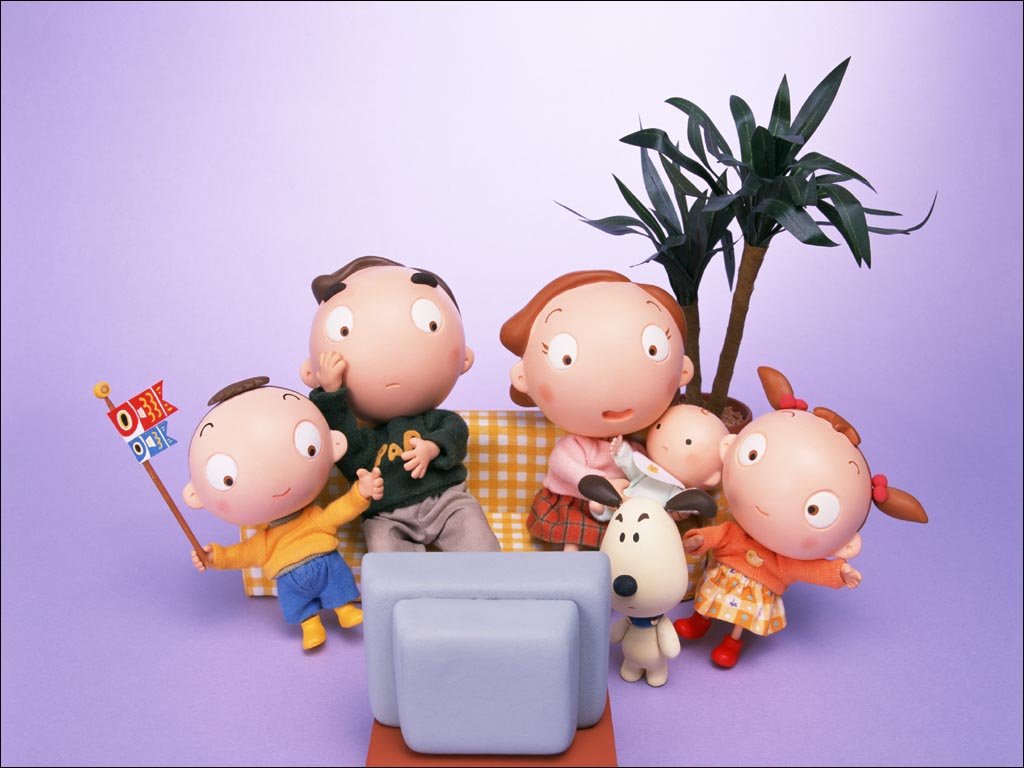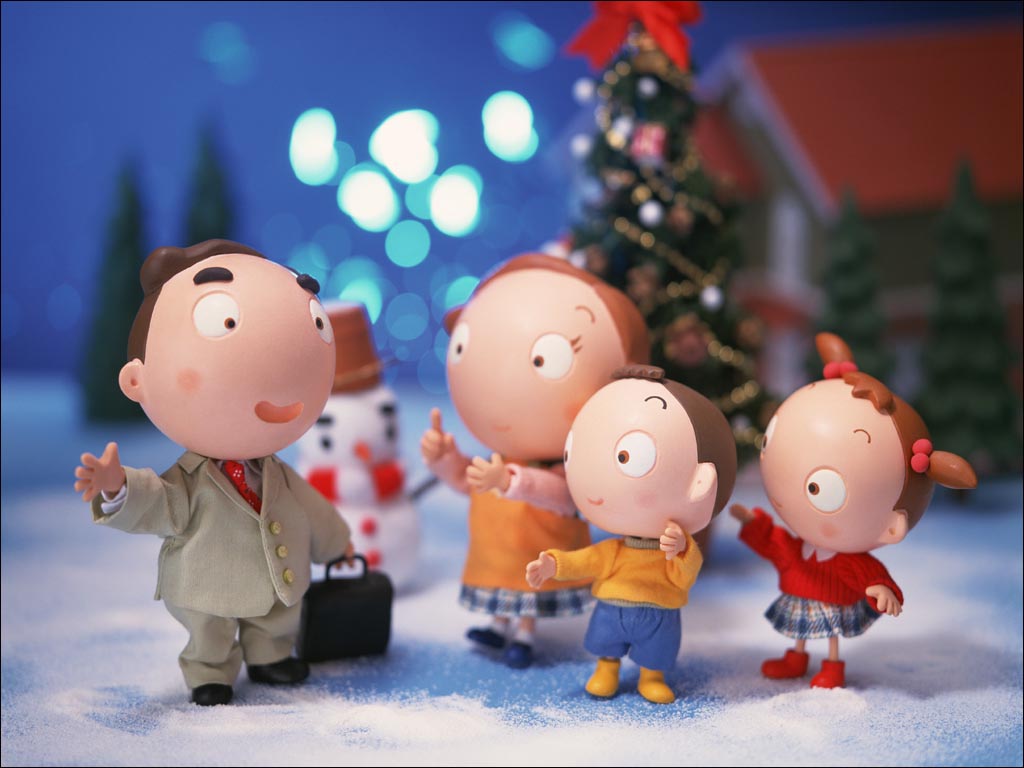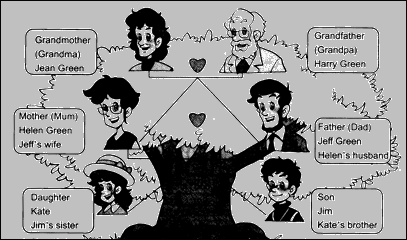CRI实用英语课堂 Unit 29 About Family I 家庭(上)
时间:2019-01-02 作者:英语课 分类:CRI实用英语课堂

Part 1 Traditional & Modern Family 传统与现代家庭
A great many people, when they speak of home, tend to appreciate it with a certain atmosphere, certain physical surroundings, and certain emotional attitudes with themselves. This sentimentality toward home is something that has come down to us from the past. Many modern people do not have it, and I think it is a good thing that they do not.
In the old days, life was difficult. Enemies could attack you and kill or rob you, and you had little protection against them. People did not live in well-built houses where doors could be locked. They did not have the protection of an organized police force or telephones which could summon the police instantly. How did this influence the way people felt about home?
Small family groups clung tightly together for protection against beasts and against other men. Only the braves went beyond the small family area. Even in the Middle Ages only the most daring went to lands beyond the sea. The human pursuit of security conditioned men to love their homes. I am sure that this feeling must have been very strong among the early settlers of the United States who were obliged, by famine and oppression, to take the plunge 2 and go to the new land where they knew no one and where they were subject to Indian attack. We can see this even today in the attitudes of minority groups who, because of a feeling of insecurity, still preserve cohesive 3 family ties.
Thanks to modern transportation and well-organized societies, thousands of people willingly and eagerly leave the surroundings where they were born, and the oftener they do so, the less sentiment they are likely to have for those surroundings. How has the meaning of this word “home” been altered by such activity? What does home mean to those people or to families who often move about, living first in one hotel and then another? I believe that for them home means a place where they can have privacy. For them, the atmosphere and surroundings of the place where their parents live have no sentimental 1 attachment 4.
Families are important to people all over the world although the structure of family is different from one country to another or from the modern family to the traditional one.
Firstly, Let's see what  similarities there are between the traditional & modern family. We can say both of them are nuclear families (with parents & their children as only members), & the role of the father in both types is to provide for his family while the mother takes care of the childre's physical & emotional needs.
similarities there are between the traditional & modern family. We can say both of them are nuclear families (with parents & their children as only members), & the role of the father in both types is to provide for his family while the mother takes care of the childre's physical & emotional needs.
Secondly 5, the differences between the two are also clear. For example, the traditional husband was the head of the household while today's husband & wife share the role; And modern woman works outside the home even after she has children, namely, she's doing two jobs instead of one, so preschool children may go to a child care center or to a baby-sitter regularly (since the mother works).
No matter it is traditional or modern, every family has the sense as following: families offer us a feeling of belonging, of love & security.
家庭是社会的细胞,是组成社会的基本单位。自从家庭诞生以来,人们生活在不同的家庭之中,休养生息,繁衍后代,享受着天伦之乐。
美国作家爱默生曾经说过:"家庭是这样一个地方,在一日之中,人们的胃口得到三餐的满足,而人们的心灵却得到千百次的满足。"
许多人在谈到家的时候往往将它和某种氛围、某种自然环境以及某些自我情感联系在一起。这种对家庭的依恋之情古来有之,代代相传。而许多现代人不再有这种情感了。
在遥远的古代,人们的生活十分艰难。那时候,小型家庭群体紧密团结,聚在一起,共同抵御野兽和敌人。只有最勇敢的人才敢离开小小的家族管辖区。甚至在中世纪也只有最勇敢的人才敢飘洋过海。人类对安全的追求决定了人们对家庭的热爱。
现在由于现代化交通设施的出现和社会组织秩序的完善,成千上万的人们愿意并且渴望离开他们的出生地。而且他们离家外出越频繁,他们对出生地的情感可能就越淡。现代人的家庭观念已经慢慢淡化了。这可能也是现代化社会发展的必然趋势吧。
但是无论人们的家庭观念如何变化,家始终是我们最温馨的港湾。在《The Wizard of Oz》,也就是童话小说《绿野仙踪》中小女孩Dorothy不是说过嘛,There's no place like home,没有地方可以像家一样给我们归属感和安全感。
在英语中,home, family和house都可以译为“家”,但是三个词的侧重点有所不同。 house侧重于“地点、住房”。一提起house很容易使人联想起房屋中的家具、设备、装饰等,如:we have a computer in the house(我们家里有一台电脑)。
family 侧重于指家庭成员的全体,它强调的是人。family 看作一个整体时,意思是“家庭”,后面跟单数动词,如把family 看作为“家庭成员”时,应按复数对待。后面的动词应是复数形式。如:My family are all tall 我们全家人都很高。 home 在三个词中最具有感情色彩,它不仅包括家人共同生活的场所,还包括“天伦之乐”“家庭团聚”的意思,如:It's time to go home 现在该回家了。 
我们刚刚说了family这个词在字典里的解释。那你知道family还可以怎样解释吗?family的拼写大家都知道是f-a-m-i-l-y, 那么以这几个字母开头,就有F - father A - and M - mother I - I L - love Y - you,也就是爸爸妈妈我爱你们的意思了,倒是跟family这个词的意义很贴合。
husband和wife也可以按照这样的模式解释,比如,wife就是W - washing; I - ironing ;F - food ;E – entertaining,几个词就概括了一个妻子的功能。husband就可以解释成 H——housing 有房子;U——understanding 有心灵相通;S——sharing 有分享的喜悦;B——buying 有钱买想要的东西;A——and; 还有N——never 绝对不D——demanding 要求太高。
wife还可以有另一种解释,W----witch 一个美女;I----intelligent 聪明伶俐;F----faithful 忠实;E----everyday 在每一天。
Part 2 Family Members and Family Tree 家庭成员

我们每个人都有很多亲属,那么我们应该怎样用英语来称呼他们呢?father,mother,dad,mom 的意思分别是“父亲”,“母亲”,“爸爸”,“妈妈”,前两个词为书面语,后两个词是孩子在家对“爸爸”,“妈妈”的称呼常用在中语中。还有daddy和mommy也是孩子们最喜欢的称呼语。
称呼还有husband,wife,son,daughter,brother,sister,uncle,aunt,nephew,niece,cousin。在father mother前面加上grand组成 grandmother和grandfather,就是祖父祖母或外公外婆,口语当中常用 grandma grandpa。这里哥哥,弟弟都用brother 来表示,sister可以同时表示姐姐、妹妹,这跟汉语是不同的,一般在西方家庭兄弟姐妹之间都可以直呼其名,那么当你必须说明你和你的兄弟姐妹之间的长幼关系时怎么办呢?可以在brother或sister前面加上elder这个词,elder brother 或elder sister,就表示哥哥、姐姐了,或者也可以加上big,这个词也能表示同样的意义。那么在brother 或者sister前面加上younger就可以表示“弟弟、妹妹”了,就是younger brother,younger sister。
英语中对亲戚的称呼跟中文也是有区别的,结婚以后,双方的直系亲属也就是immediate 6 family就都变成了对方的姻亲in-laws,比如father-in-law就是指岳父或者是公公,mother-in-law指岳母或婆婆,sister-in-law嫂子、弟媳等等,brother-in-law指内兄、内弟、小叔子、姐夫、妹夫等等。一看中英文的对照,就知道英语对亲属的称谓比起中文要简单得多。中文按年龄、男方还是女方的关系等等为亲属冠之以不同的称呼,而西方人似乎不太在乎这位亲戚是父亲这边的(on the father's side)还是母亲那边的(on the mother's side),一视同仁,给一个称呼。
更有意思的是对distant relatives,也就是“远亲”的称呼。cousin一词不分男女,概括了所有“堂兄弟和堂姐妹或者表兄弟和表姐妹”。而“侄子或外甥”都是nephew;“侄女或外甥女”则都是"niece"。不过,尽管英语中的称谓不如中文的分工细致, "Blood is thicker than water"(血浓 于水)是东、西方人都认同的。
于水)是东、西方人都认同的。
那么,既然英语的家庭关系词汇不难,那我们来听听下面这段话,看你是否能根据这段话画出一张family tree。
还是先来解释一下什么是family tree 吧。family tree顾名思义就是“家谱图”,英文解释为A family tree is a diagram(表格)of the people in a family. 就是指家庭成员关系的图解描绘。感兴趣的朋友们可以根据下面这段话自己动手画一画。
听力材料:
Stephanie is the youngest in her family. Her elder brother Mark is married with a son Kevin. Her sister-in-law Rose used to go to the same high school with Stephanie. Her sister Kate married Thomas Hawkins last year and they've just had a baby daughter Millie. Stephanie adores her nephew and niece. Bart and Marie are Stephanie's cousins. They are children of Barbara and Peter. Aunt Barbara is the younger sister of Stephanie's father Gordon. Stephanie's mother Joy had a younger sister Liz who is divorced with a daughter Lily. Both grandparents on Stephanie's father's side have passed away. But her mother's parents Lucas and Nancy are living not far away from their house.
Part 3 Family Types 家庭类型
Jake: Do you know what an extended family is? 
Anne: Yeah. In the past, parents, their children, their children's children used to live together. This kind of family is known as an extended family.
Jake: What about a nuclear family?
Anne: Nowadays, only two generations, that is to say, parents and children live together.
Jake: How about a single parent family?
Anne: That's a family with only a mother or only a father.
Jake: So what is a blended family?
Anne: When two people who have been married and have children, remarry, and both groups of children live together. Why? You indeed asked me so many questions about family.
Jake: I just want to make a survey of public opinion on family ties.
讲解:
1. 对话中Jake在做一个关于对家庭关系的看法的调查,他问了Anne一些关于家庭类型的问题。那么在对话中出现了几种家庭类型呢?有extended family,就是“大家庭”,在过去呢,父母和他们的孩子以及孩子的孩子都住在一起,就是那种四世同堂的大家庭,不过随着时代的发展,这种大家庭已经很少了。
2. 另一种家庭类型就是nuclear family,核心家庭,也就是说,父母和他们的孩子住在一起,这是现在一种比较普遍的家庭类型。that is to say,作为插入语表示“换句话说;也就是说;更确切地说”。还有一种类型叫做single parent fam ily,就是我们说的“单亲家庭”。就是家里面只有母亲或只有父亲。
ily,就是我们说的“单亲家庭”。就是家里面只有母亲或只有父亲。
3. 这种家庭类型主要是父母离婚的产物。对话中出现的最后一种家庭类型就是blended family,混合型家庭,就是指再婚后的家庭,男女双方的孩子都住在一起。marry前面加上前缀“re”表示“再婚”。make a survey of something,表示“对…作全面的调查”。
4. 这里再补充一种家庭类型,就是“丁克” 家庭。“丁克”的英文意思是:双份收入,没有孩子,double income, no kids。是近年来新兴的一种家庭模式,这种家庭中只有夫妻二人,不生孩子,既有家庭的温馨,又保持了“单身贵族”的潇洒。
Part 4 Some Sentences about Family 跟家庭有关的句子
1. Tell me about your family.
告诉我你的家庭情况吧。 
注释:用family,表示家庭成员的情况,一般不能用home.
2. How many people are there in your family?
你家有几口人?
3. Do your parents still work now?
你父母还在工作吗?
4. Do you have a brother or a sister?
你有兄弟姐妹吗?
注释:表示疑问,用or 而不用and。
5. What does your husband /wife do?
你丈夫(妻子)干什么的?
6. Where do your parents live?
你父母住在哪里?
7. How old is your daughter?
你女儿多大了?
8. Where does your son study?
你儿子在哪上学?
9. Learning to be an understanding, co-operating member of the family is the biggest sign of growing up.
成熟的最明显标志是做一个理解别人,合作的家庭成员。
10. Parents are old-fashioned.
父母很老土。
11. My daughter is too careless with money.
我的女儿花钱总是大手大脚。
- She's a sentimental woman who believes marriage comes by destiny.她是多愁善感的人,她相信姻缘命中注定。
- We were deeply touched by the sentimental movie.我们深深被那感伤的电影所感动。
- Test pool's water temperature before you plunge in.在你跳入之前你应该测试水温。
- That would plunge them in the broil of the two countries.那将会使他们陷入这两国的争斗之中。
- She sealed the parcel with cohesive tape.她用粘胶带把包裹封起来。
- The author skillfully fuses these fragments into a cohesive whole.作者将这些片断巧妙地结合成一个连贯的整体。
- She has a great attachment to her sister.她十分依恋她的姐姐。
- She's on attachment to the Ministry of Defense.她现在隶属于国防部。
- Secondly,use your own head and present your point of view.第二,动脑筋提出自己的见解。
- Secondly it is necessary to define the applied load.其次,需要确定所作用的载荷。